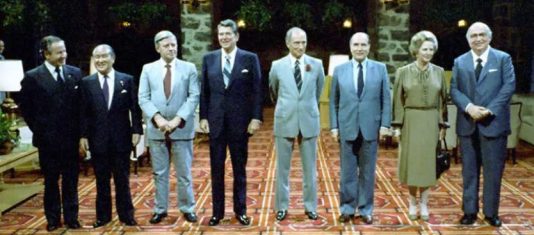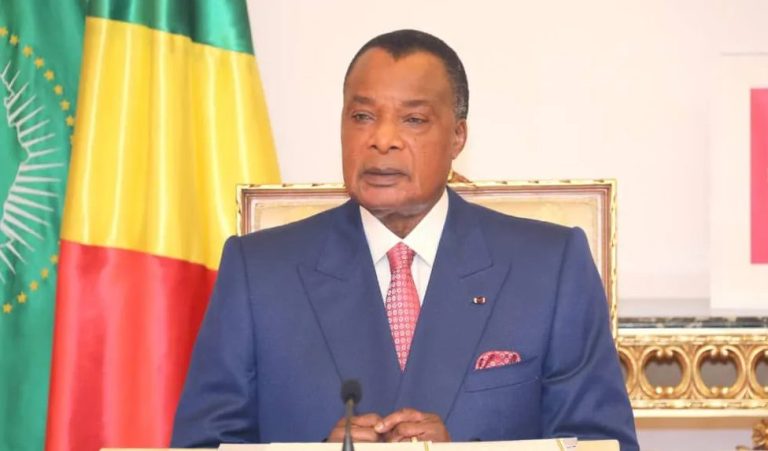
To date, Canada has hosted 6 G7 meetings. The first took place from July 19-21, 1981 (when this photo was taken) and was held in Ottawa-Montebello, Ontario-Quebec. © G7 Canada
Israel’s strikes on Iran and Tehran’s retaliation, which appeared to catch many world leaders off guard, are the latest sign of a more volatile world as Trump seeks to withdraw the US from its traditional role as global policeman.
Speaking on a flight to Canada for the summit, British Prime Minister Keir Starmer said he had discussed efforts to de-escalate the crisis with Trump, Israeli Prime Minister Benjamin Netanyahu, and other world leaders.
Britain is sending fighter jets and other military reinforcements to the Middle East.
“We do have longstanding concerns about Iran’s nuclear programme. We recognise Israel’s right to self-defence, but I am absolutely clear that this needs to de-escalate. There is a huge risk of escalation for the region and beyond,” Starmer said, adding that he expected “intense discussions” at the summit.
As summit host, Canadian Prime Minister Mark Carney has decided to abandon the annual practice of issuing a joint statement, or communique, at the end of the meeting.

With other leaders seeking to persuade Trump not to impose tariffs, the summit risks becoming a series of bilateral conversations rather than a show of unity.
Trump is the summit wild card. Looming over the meeting are his inflammatory threats to make Canada the 51st state and take over Greenland. French President Emmanuel Macron arrived in Greenland on Sunday for a highly symbolic stop en route to Canada, meeting the Arctic territory’s leader and Denmark’s prime minister aboard a Danish helicopter carrier.
Macron’s office said the trip to Greenland is a reminder that Paris supports the principles of sovereignty, territorial integrity, and the inviolability of borders as enshrined in the UN charter.
Macron, one of the few leaders to have known Trump during his first term, was the first European leader to visit the White House after Trump took office, emerging unscathed from the Oval Office encounter.
However, despite their occasional rapport, Macron’s approach to Trump has failed to yield major results, with France caught up in the president’s planned tariffs on the European Union.

Nor did it bring any US security guarantees for Ukraine, despite Macron’s efforts, together with Starmer, to build a coalition of nations that could deploy forces after any ceasefire with Russia, in the hope of convincing the Trump administration to provide backup.
Trump is due to arrive late Sunday in Kananaskis, Alberta. Bilateral meetings between other leaders are possible on Sunday, but the summit programme does not begin until Monday.
Peter Boehm, Canada’s sherpa for the 2018 G7 summit in Quebec and a veteran of six G7 summits, expects the heads of state to pivot discussion to devote more time to the war.
“Leaders can accommodate a discussion, perhaps even a statement,” Boehm said. “The foreign policy agenda has become much larger with this.”
‘He tends to be a bully’
Leaders who are not part of the G7 but have been invited by Carney include the heads of state of India, Ukraine, Brazil, South Africa, South Korea, Australia, Mexico, and the UAE. Avoiding tariffs will remain a priority.
“Leaders, and there are some new ones attending, will want to meet Donald Trump,” Boehm said. “Trump doesn’t like the big round table as much as he likes the one-to-one.”
Bilateral meetings with the American president can be fraught, as Trump has used them to try to intimidate the leaders of Ukraine and South Africa.

Former Canadian Prime Minister Jean Chrétien told a panel this week that if Trump does act out, leaders should ignore him and remain calm, as Carney did in his recent Oval Office meeting.
“He tends to be a bully,” Chrétien said. “If Trump has decided to make a show to be in the news, he will do something outrageous. Let him do it and keep talking normally.”
Starmer had a warm Oval Office meeting with the president in February, wooing Trump with an invitation for a state visit from King Charles III. Trump has praised the British prime minister, despite their political differences.
Zelensky expected to meet Trump
Last month, Britain and the US announced a trade deal that will slash American tariffs on UK cars, steel and aluminium. It has yet to take effect, but British officials say they are not concerned the Trump administration might renege.
Starmer’s attempts to woo Trump have left him in an awkward position with Canada, the UK’s former colony, close ally, and fellow Commonwealth member. Starmer has also drawn criticism — especially from Canadians — for failing to address Trump’s stated desire to make Canada the 51st state.
Asked if he has told Trump to stop the 51st state threats, Starmer told The Associated Press: “I’m not going to get into the precise conversations I’ve had, but let me be absolutely clear: Canada is an independent, sovereign country and a much-valued member of the Commonwealth.”
The war in Ukraine will be on the agenda. President Volodymyr Zelensky is due to attend the summit and is expected to meet with Trump, a reunion coming just months after their bruising Oval Office encounter which laid bare the risks of a meeting with the US president.
Starmer met with Carney in Ottawa before the summit for talks focused on security and trade, in the first visit to Canada by a British prime minister for eight years.
German officials were keen to counter the suggestion that the summit would be a “six against one” event, noting that the G7 countries have plenty of differences of emphasis among themselves on various issues.
“The only problem you cannot forecast is what the president of the United States will do depending on the mood, the need to be in the news,” said Chrétien.
(With newswires)




